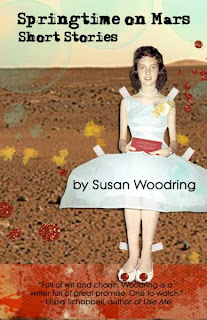Susan Woodring
Press 53 ($14.00)
The title of Susan Woodring’s collection of eleven short stories, Springtime on Mars, suggests, if not science fiction, something otherworldly. It’s an unlikely promise that is kept in story after story.
In the book’s opener, “Inertia,” the neighbor boy shows off a small black stone he has found and speculates that it might not be from this planet. While the narrator’s mother supports the theory that perhaps we’ve had visitors from outer space—she’s a former science teacher—the father isn’t so sure why aliens would bother with earth. The narrator invokes the principle of inertia to offer a possible explanation: “People will do anything to sustain their way of life.” And while the story is partly about the crush the narrator has on the neighbor boy, it’s also about the mother’s own inertia as she spins helplessly away from reality.
One of the most powerful stories in the collection comes next and it also deals with space travel. In “Morning Again,” Harold and his wife Jean are taking care of Harold’s grandchildren from his first marriage. Jean wants Harold to take her to Florida to watch a space shuttle launch, and they don’t let the fact that the kids’ mother is unreliable and doesn’t come back to get the children stop them. They all hit the road to see the launch and Jean tries to turn the experience into an educational trip for the kids, who are hard to reach. They don’t quite make it in time for the launch but they watch from a distance as the Challenger lifts off and then explodes. The point, it seems to me, is that we learn from our mistakes, and trying is the important thing, regardless of the outcome. It isn’t clear that the kids learn the lesson, but Jean in the end keeps trying.
Then there is the title story, in which the narrator Paige looks back at an incident that occurred when she was twelve, involving her friend Carla and an attention-seeking neighbor boy. Another boy, Timothy, plays with tiny “Martians” and speculates that spiders are actually extra-terrestrials. It is his picture of an alien world that gives the story its name, and it is his mother’s odd, yet heroic, action that gives the story its emotional heat. We’re all aliens on this planet, the story seems to be saying, and how can we survive if we’re alone?
That, it seems to me, is a theme that many of these pieces share, whether or not there are explicit references to other planets or space exploration. In “Birds of Illinois” it isn’t an alien landscape that unsettles the characters, but the unfamiliarity of retirement, of an existence that is suddenly empty and must be filled in order to be lived. In “Love Falling,” the narrator Julie has allowed herself to be taken north to Chicago by her boyfriend because he’s failed at everything he’s tried in the South. Despite being in a new environment, Julie actually fits in well. But the boyfriend’s true nature is exposed and Julie realizes—fortunately—that it’s a world she wants no part of.
Overall, this is a strong, tightly woven collection of short stories that will reward any reader.
For other reactions to this book, check out the author’s other stops on her Blog Stop Book Tour.


>Thanks, Cliff! The Challenger story was one that came in late in the process–and one of my favorites as well.
~sheryl, P53